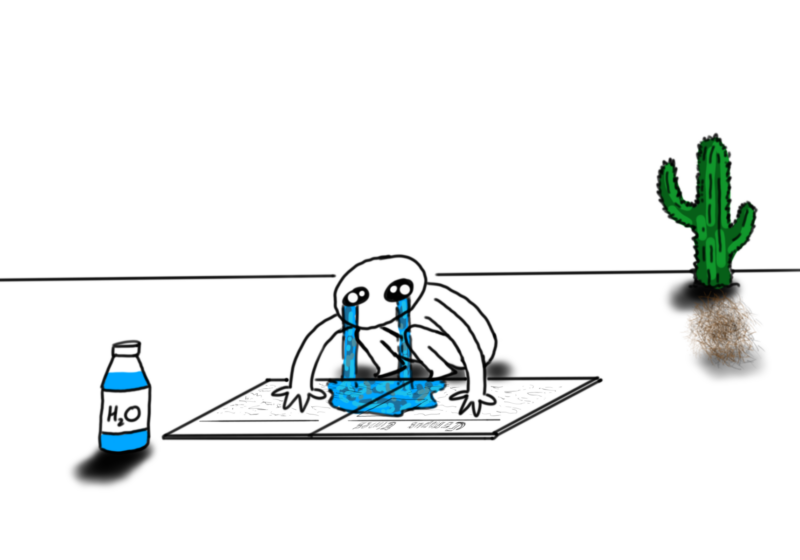As of today, there are about three weeks of classes left in this semester.
Does this freak you out? Did you just realize that you let the semester pass by, and your grades aren’t where they should be? Fear not! Use these tips to help you get back on track and make this a successful semester.
1. Don’t freak out
This is the most important of all the points in this article.
There’s more than enough time to bump up a sad grade to a happy one. There are still homework assignments, midterms and papers left. In most classes, only about 50 percent or less of the grade has been accounted for. If you get your head in the game now and focus, you can use the rest of the ungraded work to haul yourself back up. Acceptance of your situation is what will motivate you to get cracking.
If you’re finding yourself stressed, talk to a friend, professor or advisor, or go to University Counseling Center and help yourself mentally. Your personal health is more important than your grades.
2. Talk to the professor.
You screwed up. Don’t lie to yourself. And, don’t lie to the professor either when you make an appointment with them to talk about what you can do to improve. The professor can tell when you’re being honest and when you’re just making excuses for yourself. If you go and tell them earnestly that you didn’t focus hard enough this semester but are going to now, the professor will likely want to help you.
Visit their office hours, send them emails, do everything you can to build that relationship with your professor. They will see that you are willing to work hard and will help you in any way they can.
3. Don’t skip meals.
Sometimes, you may find it difficult to make time to have a meal two or three times a day. Between classes, jobs and other responsibilities, you may find yourself having at most 10 minutes or even less to scarf down whatever Danforth has that day before you’re on your way to your next commitment. You may find yourself having to skip meals every day.
This is bad.
Not only does having a growling stomach distract you from your work, you are also physically tired when you don’t eat enough food and may find yourself constantly feeling weak. Consider getting a clamshell so that you can fill it full with food to eat later or preparing meals beforehand that can be reheated and consumed right away.
Don’t forget to drink enough water as well. A tall glass of water will refresh you and help keep hunger at bay. Always keep a water bottle with you and take sips every so often.
4. Get up-to-date with your work.
Are you behind on your work? Have you missed class a few times and are feeling lost? Take a night to work. Study all the material you’ve missed so far.
Nearly every professor has a syllabus with a course schedule, so make sure that you’re current on every lesson. You can’t expect yourself to get ahead when you’re behind. Then, when it comes time to do homework or study for a midterm, you’re not cramming or learning new material—you’re just reviewing material you already know. Don’t be the one playing catch-up.
5. Don’t overload yourself.
Extracurriculars are very important. They help take your mind off school and let you relax and do something you enjoy. But, education must be prioritized. If you’re finding that you don’t have time to study because you have a slew of meetings, consider dropping a few lesser-priority meetings to get more study time. Once you’re ahead and feel that you’re prepared for class, you can pick them up again.
It may be tough to drop things you really like doing, but it’ll make your life easier to have more brain power to focus on studies.
6. Get a tutor.
Do this now. Your best resource is going to the Center for Excellence in Teaching and Learning (CETL) tutor website and signing up for a slot that works for you. If your class doesn’t have a CETL tutor, go to your TA’s office hours or ask someone who took the class previously.
Even if you know the material, review problems from the homework or the textbook. Having someone advise you on the work will help solidify the material as well as understand the mistakes you’re making. Review as much as you can before so you can go in with questions and get something out of it.
7. Don’t go on social media.
This is the probably the toughest one to do, but also the most obvious. Having to cut out Facebook, Twitter, Tumblr, Reddit and all other websites might seem daunting, especially when you’re attached to them. But, think of how much these websites are consuming your time: every time you get remotely bored, you may find yourself gravitating towards your phone or to the URL bar to distract yourself. But, the more time you spend on Facebook, the less you’re spending on your work.
By no means think that you have to deactivate all of your accounts (although, if you do that, more power to you). Just install an extension in your browser that blocks a website for a certain time period, such as Block Site for Chrome. Out of sight, out of mind.
8. Clean your room.
Pick up the clothes on the floor and do the laundry. Clean out the garbage and put a fresh bag in. Wipe down all surfaces and make your bed.
Having a clean room will allow you to breathe and make space to work. Not having to trip on cords or clothes will allow you to focus and relax.
Also, the act of cleaning will serve as a calm distraction to your brain. The mundane, repetitive tasks will allow your brain to be on autopilot and recharge. Not only are you helping yourself, but you’ll be relaxing yourself and getting ready for your next study session.
9. Don’t spend the night up.
This is another difficult one to do. It’s easy to think that you need to spend all night up to catch up. Sometimes, it’s the only option you have. But, what good does it do to stay up until 5 a.m. and be sleepy all day? If you don’t have a morning class, then consider going to sleep early and setting an alarm to get up earlier. Not only can you fit in a nice, full breakfast, but you’ll be awake when it’s bright outside, which will keep you up. Also, consider using the weekend to work, so that you’re free during the weekdays.
10. Keep a calendar.
Pencil in everything. Put in classes, extracurriculars, jobs, everything. This way, you’re able to visualize your free time and study more efficiently. You may use the hour between class to relax because it seems like it’s too short of a time to crack open your book, but, seeing it on your calendar as a big, empty spot will motivate you to fit in a lesson or two and review during the time.
You can even go the extra mile and schedule in free time and meal times, so that you can just look at your calendar to know what you’re supposed to be doing. It’s nice to be organized.
Though three weeks seem short, with the inclusion of weekends and Thanksgiving break, you’ll have enough time to raise your grades. But, it’s not enough to recognize that there is a problem—it’s important to act on your mistakes and be willing to change.
Imagine how much happier you’ll be when you log in to Blackboard after finals and see grades you like. Get working.





